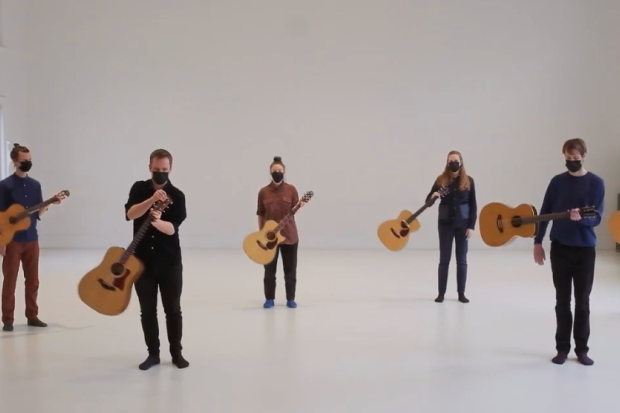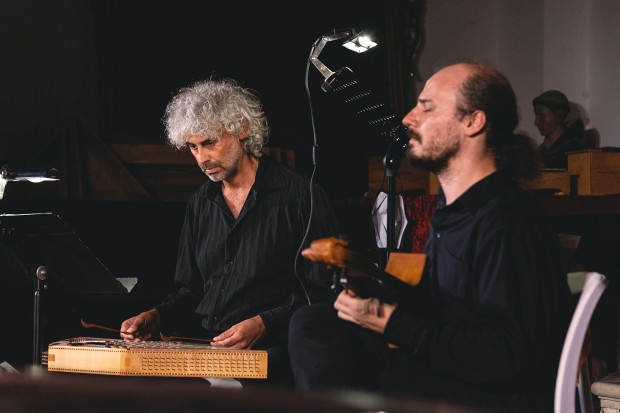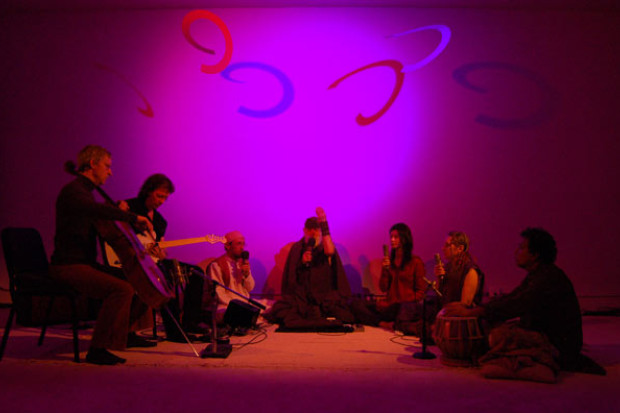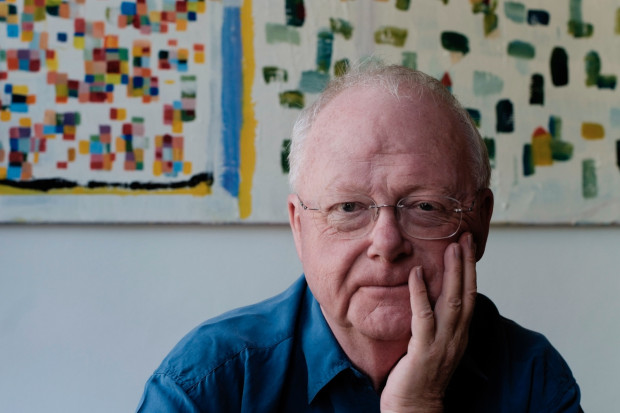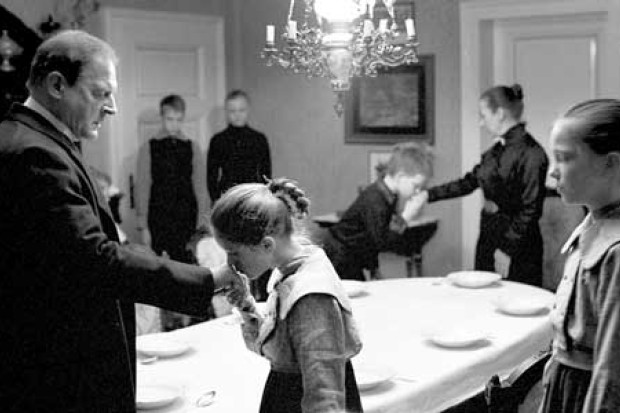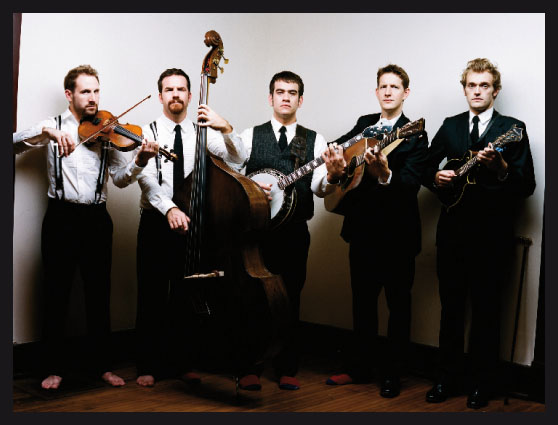
On the Feet of Doves
Blank. It can seem so unpromising. Then again, from another perspective, perhaps a new world awaits you there. Blank: a CD-R, a forthcoming release in a brown, quasi-cardboard sleeve and only these details: ‘Punch Brothers. Punch. For promotional use only. Not for sale. Nonesuch Records.’
So you load the disc and press Play and from the opening bars of Track 1 – and it’s ‘Track 1’ because you haven’t bothered to look at the title yet – you find yourself riveted. Now this is different.
Discordant, dissonant, unorthodox fingerings… was that a high A on the double bass’ G string? Is that a low C too? Whirling mandolin and banjo figures seem to hark back to traditional bluegrass, but also look forward to current developments. What is this music?
And so you wait for the end of Track 1 and eject the disc and this time you read past ‘Punch Brothers. Punch. For promotional use only. Not for sale. Nonesuch Records’ to the name of the piece (‘Punch Bowl’) and the musicians’ names: Gabe Witcher, fiddle; Noam Pikelny, banjo; Greg Garrison, bass; Chris Eldridge, guitar; and Chris Thile, mandolin. Finally a sliver of recognition crosses your mind: Chris Thile… Nickel Creek… the wonderfully eclectic band that came out of bluegrass but quickly found itself playing in and across every genre without missing a beat… that Chris Thile…
And yet, though Nickel Creek pushed out the boundaries, especially on its Why Should The Fire Die? album, even it was never as discordant as this, never as thematically questing, nor even as musically daring as here and beyond, as you discover soon enough, because ‘Punch Bowl’ is perhaps the most straightforward piece on the album.
So you reinsert the CD and quickly find yourself pressing Stop and Eject again and reaching for a pen and writing down the track listing and in the writing comes the realisation that Tracks 2-5 are a 40-minute, four-movement suite and the very heart of the album. The Blind Leaving the Blind. Yes, a 40-minute, four-movement suite – on a bluegrass album?
Then there are the international release dates for this disc: Ireland on February 18th, England on February 19th and America on the 22nd. But Ireland first… just how healthy is the bluegrass scene in Ireland? A question for Niall Toner, singer, songwriter, instrumentalist, bandleader, recording artist and broadcaster: ‘It’s very healthy, really, with about twenty bands active locally and dozens of American bands coming here on tour every year. There’s also a very healthy festival scene with Kilkenny, Omagh, Westport, Dunmore East and Colfer’s in Wexford among the best.’
That Heavenly Song
Rainswept Dublin, a jaunt to the Lord Edward Tavern (opposite Christchurch) and a surprise gig for a small audience comprising mainly of music journalists, broadcasters, record shop managers and record company staff. Though the Punch Brothers were over for the celebrated Celtic Connections Festival in Glasgow, it was today that the band was actually making their European debut.
Just two hours earlier the players were in RTÉ producer Aidan Butler’s house recording over two hours of music and chatting with Niall Toner for a Roots Freeway Special on RTÉ Radio 1 in May. ‘As a mandolin player myself’, says Toner, ‘I was blown away by Chris Thile’s technique, and I’ve been practising like a maniac ever since!’
One can quickly hear why. Thile is not only a virtuoso, but also something of a pioneer who has often played and jammed on pieces by Bach and other classical masters in his live performances. But here, in the Lord Edward and on the Punch album, he’s set out his stall in the aforementioned genre-bending The Blind Leaving the Blind.
The music actually gave birth to the group. Thile got stuck into the writing of the piece when John Adams invited him to perform at his In Your Ear Redux festival, at Carnegie Hall’s Zankel Hall. Thile and band took to the stage as The Tensions Mountain Boys, before morphing into the Punch Brothers (after the Mark Twain short story, Punch, Brothers, Punch!).
The Blind Leaving the Blind, however, doesn’t utilise a traditional or even unorthodox chamber ensemble. Thile has scored it along bluegrass lines: mandolin, banjo, guitar, violin, and double bass. Perhaps scored isn’t the right word, but then improvised is not correct either, since the suite is both at times, and moves within both methods effortlessly. Thile explains:
A good deal of it is written out: the score is 104 pages long, so it’s a long piece. But though some of it reads like a classical string quintet, I left places that resemble more of a jazz lead sheet because sometimes the piece goes into complete improvisation and that, in night-to-night performance, can be thrilling and drastically different from the record.
The bare bones, the basic idea that I started out with was this: I wanted to reflect firstly, my abilities on the mandolin, but as the piece grew and the band fused I wanted to reflect everybody’s capabilities as players – but also singers. None of us are really singers but all of us can sing. I kind of had Mahler’s 4th Symphony in mind – that tremendous ratio between orchestral music and the voice in the last movement – how the Mahler symphony itself grew out of that heavenly song in the finale.
I often try to write music that’s really open to interpretation and so there are sections within The Blind Leaving The Blind that I left open for musicians of the calibre of this band.
Textures Left Hanging
Throughout the adventurous playing and protean arrangements is a sustained humour and darkness. No surprise, then, to learn that a lot of this music was partially inspired by failed relationships. It has, for all the dazzling craft, an aura of the confessional and the impassioned – a tone somewhere between a searing, private letter and a late-night conversation overheard in a crepuscular bar.
One doesn’t have to spend much time with Punch to guess why one section of the traditional bluegrass audience has been startled, another section delighted and yet another outraged. And there’s more: classical and jazz are not the only inspirations here – bands like Radiohead and the Strokes also come to mind at times.
Turn to ‘Nothing, Then’ for another fascinating voyage of discovery. Not so much bluegrass meeting rock as rock meeting bluegrass. Did they have rock music sonorities in mind? Chris Thile:
I’ve gotten really obsessed with the down-stroke thing in rock music, even though it’s almost a caricature of rock. It’s just down-strokes [hums]… chunk chunk chunk chunk chunk chunk chunk chunk… and yet it is similar to bluegrass in a way. Bill Monroe was almost all down-strokes too… But I was chasing the idea of catching – of transcribing – the occasional repetitiveness of a dream, the occasional obsessiveness that surfaces. See, I think that rock music has often struck on all of these amazing textures, but has then sometimes gotten lazy about the development of them. There are exceptions, but, as a general rule, there are great textures suggested by bands like the Strokes that are left there ‘hanging’.And so in ‘Nothing, Then’ you have a melody that is considerably longer per bar than the chord progression, and then you’ve got a lick that works over everything, and a harmony that doesn’t necessarily relate… It’s really more of a minimalist approach, but all of it superimposed over a kind of rock sensibility. I mean, is it really that far from Steve Reich’s Music for 18 Musicians to the work of the Velvet Underground?
No, it isn’t, and our conversation quickly veers into John Cale and La Monte Young. Throughout all of this I am struck by just how much the Punch Brothers integrate rather than imitate, and for some reason what Nietzsche said about ‘revolutions coming on the feet of doves’ rings in my mind. Thile assures me that he wants to work with Alarm Will Sound and Bang on a Can.
Infectious Jungle
Niall Toner is also impressed by the Punch Brothers, describing them as ‘… very innovative, very precise and very dedicated’. Then he says something that makes the hair stand on the back of the neck: ‘They are fairly typical of what you come across in bluegrass these days. Aidan Butler and I recorded about a dozen bands in Nashville last October who would all be in the same “ballpark”, as the Americans say.’
In Mark Twain’s original story the narrator reads a melodious jingle in the morning newspaper, but it’s a jingle that quickly smothers his mind and he loses all concentration. He is only ‘cured’ when he inadvertently transfers the jingle onto a friend.
A few days later the friend is in an awful state: the jingle keeps on repeating and repeating in his mind. Both of them then transfer the jingle onto some college students, freeing themselves but infecting others.
There are no jingles here, but with such creative playing from each musician, there is music that can be listened to in any number of ways. Songs for swingin’ lovers, as Sinatra sang, but also sounds for wide-open skies. Infect yourself: Punch Brothers. Punch. Nonesuch Records.
Published on 1 March 2008













